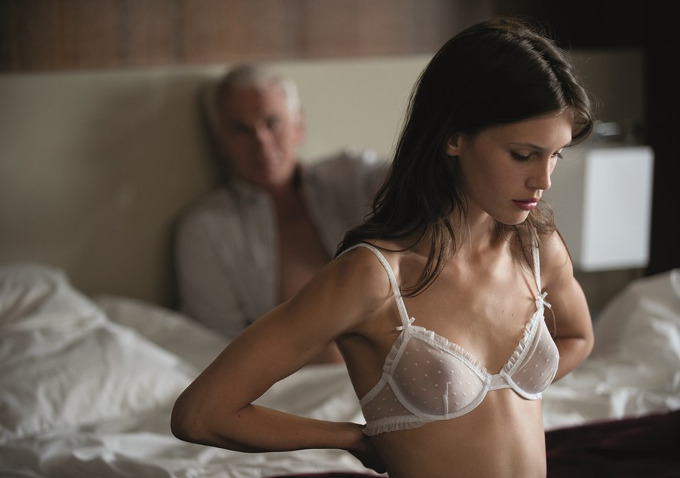
“No one’s serious at seventeen,” goes a line from Rimbaud’s poem of the same name, and it’s just one of a handful of confused messages in Francois Ozon‘s “Jeune Et Jolie (Young And Beautiful),” a flesh-filled exploration of teenage sexuality. Ozon, no stranger to provocative imagery, takes off the rose-colored glasses for his look at youthful dalliances and coming-of-age. Indeed, there is nary a sexual experience or conversation within the film that isn’t marked by some kind of confusion, pain or absence of feeling, with “Jeune Et Joli” either the profile of a single wayward youth or a declaration that sex has devolved into a crude transaction.
This kind of uncertainty is indicative of the movie itself, told through the eyes of the undeniably beautiful, 17 year-old Isabelle (Marine Vacth). Spanning four seasons (if only to give the movie a structure), we open in the Summer, as Isabelle vacations with her family in the south of France. She’s fallen an into easy going relationship with Felix, but she prefers to keep it impersonal, initially refusing to bring him back to her house for dinner, after her parent’s request. “He’s too dumb,” she quips, but he’s also traditionally handsome. And at the age when hormones are raging, Isabelle has discovered the release masturbation provides.

Felix pursues her, but Isabelle is cooly indifferent. “If you like,” tends to be her general response to anything he asks, and yet, when it comes to losing her virginity one night on the beach, her guard immediately comes down. She doesn’t love him and the experience isn’t pleasurable (Ozon underscores this by having Isabelle stand outside herself, watching, as it happens), but what she really feels and how it has changed her remains inscrutable. And thus, when we get to the Fall, and she has decided to become a prostitute, the move is as shocking as it is wholly mysterious. It’s this enigmatic quality to the film that makes it somewhat compelling, even as it trades in many of the cliches we’ve seen from this kind of story.
Indeed, the Fall portion of the film brings to mind recent pictures such as “Elles” and “Sleeping Beauty,” which both focused on young women who slide into selling their bodies. And as you might expect, Isabelle’s experiences don’t always go so well. From being humiliated and cheated out of money, she eventually learns how to protect herself, but it’s not the money she needs nor the affection—she’s very well cared in both departments at home—so then what it is it? Ozon explains in his notes for the film that the movie is to act more as a metaphor for the limits teenagers will push as they are entering adulthood and dealing with their sexuality, but his decision to keep motivations obscure, undermines the second half of the movie.

“This young woman is a mystery to me, too. I’m not ahead of her, I’m simply following her, like an entomologist gradually falling in love with the creature he’s studying. She says very little….The idea is to accompany her, identify with her,” he says in the film’s press notes, but the problem is that she’s difficult to relate to when her actions often seem guided by emotional forces beyond our understanding. When the consequences of her prostitution finally come to light in the final two acts, Isabelle still mostly remains internal, refusing to even attempt to explain what would push her to selling her body, mere months after losing her virginity. We can’t connect to Isabelle and she refuses to connect with anyone else in the movie, which eventually becomes slightly tiring.
“The portrait of a 17-year-old girl in 4 seasons and 4 songs,” reads the cryptic tagline for the movie, and indeed a Francois Hardy tune highlights each section of the movie, but the lyrics are simply crude regurgitations of what we’ve seen transpire on screen. Even the titles alone—”The Love Of A Boy,” “When Even Try?,”” “First Encounter,” “I Am Me”—give a pretty good idea of what we get out of Isabelle, and the film, and they don’t offer much more in terms of texture or thematic development.

“You scare me,” says her mother (Geraldine Palahis) at one point, and Isabelle’s unpredictability does seem dangerous. Vacth is strong in the role, requiring her to fill in much of what Ozon leaves open, and she shares a great chemistry with Palahis; the two together share one of the film’s great scenes when Isabelle’s prostitution is discovered by her parents. It’s a powerful moment, marked by some very authentic reactions from both mother and daughter, but it also highlights the main disconnects of the picture.
Ozon wants to have it both ways with “Young & Beautiful,” using a young woman’s risk-filled sexual awakening as an illustration of coming-of-age, while also demanding a realism from a situation that he keeps far from being rationalized and justified. Holding the cards back from the audience can be a rewarding experience, but here it leaves much of the filmmaker’s own purpose not just open to interpretation, but to question. At its base level, it’s an argument that Ozon positions thusly: “Adolescence is often idealized in cinema. For me it was a painful period of complicated transition and I’m not nostalgic about it.” It’s a powerful and personal point-of-view, but in asking the audience to do half the legwork for him, “Young & Beautiful” misses an opportunity to say something definitively different about being seventeen. [C]
This is a reprint of our review from the 2013 Cannes Film Festival.

